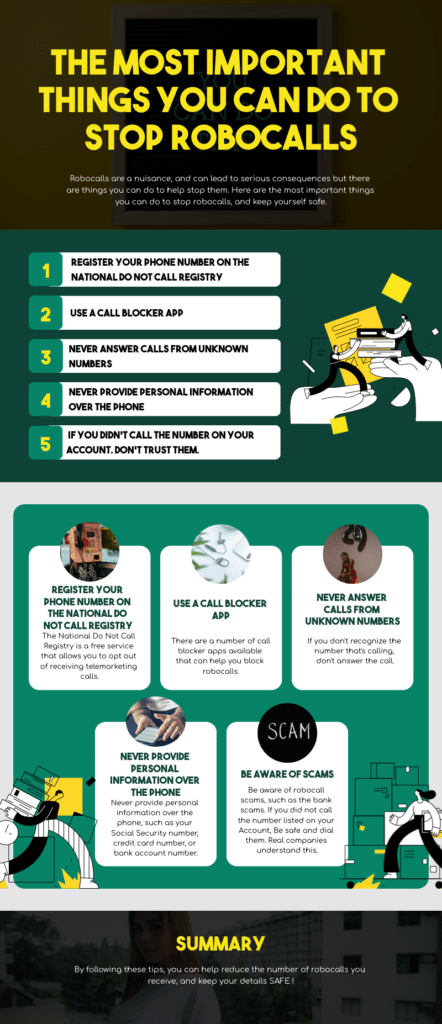Frustrated with Robocalls, We Can Help
Are you tired of constant interruptions from pesky robocalls? Isn’t it frustrating to pick up the phone only to hear an automated voice on the other end? Well, it’s time to say goodbye to those annoying robocalls once and for all. In this article, we will share practical strategies to stop them in their tracks.
Robocalls have become a widespread problem, with millions falling victim to these intrusive calls daily. They not only disrupt our daily lives but also pose a threat to our privacy and security. That’s why it’s essential to take proactive measures to protect ourselves.
With these strategies, you can regain control over your phone and enjoy a peaceful, uninterrupted day. Say goodbye to annoying robocalls and reclaim your privacy with these practical solutions. These work on stopping mobile and land line Robocalls.
Why are these Robocallers allowed to do this?
VOIP has a massive downside, with so many such VOIP providers available and phone number spoofing. The use of auto-dialers makes this a much simpler task for scammers. Some of these VOIP carriers also know and don’t care that these scammers are using their networks.
Long story short, the world of telephony is the Wild West. Attempts to shut the scammers down lead to more popping up elsewhere.
The US FCC (Federal Communications Commission) took bold steps in 2021 to address this issue. This battle will be far from over for quite some time.
Laws and Regulations Surrounding Robocalls
In America alone, Robocall scams have cost around 30 billion USD over the last twelve months.
A great question screamed by everyone annoyed about this,
The “Telecommunications Act of 1996” was designed to break up massive phone companies. It allowed other smaller companies to bring in new technologies, such as VOIP (Voice Over Internet Protocol). This reduced Robocall phone bills to almost nothing.
FCC Update for 2024
Around February 2024 the FCC confirmed that it is now restricting the use of AI generated in phone calls to you. Essentially it is part of the same 1991 ruling that protects consumers from pre-recorded messages.Any company that wishes to use this technology must obtain permission from you to do so.
There are legitimate Robocalls, though. For example, your pharmacy may call when your prescription is ready. Or your child’s school can alert you about important events such as snow days.
The key difference here is that these are services you sign up for. They do not try to part you from your money; they are businesses with which you have an existing relationship.
Is It Better To Ignore Or Decline Spam Calls?
Answering a Robocall and screaming at them down the phone is often tempting. This action is one of the worst things you could do. Spam calls often use recorded messages; you tell them your line is active by answering them. Which in turn will lead to more and more calls.
The better policy is to ignore these calls and use our mitigation measures to help reduce them.
Why Am I Suddenly Getting So Many Spam Calls?
As you answer calls, the spammers could make money by selling your number to others; the market for active numbers that humans will answer is more extensive than you might think. If your caller is not a caller ID name and number that you know, let it go to voicemail. Honest people should leave you a message.
Why Do Robocallers Call Then Not Say Anything?
This is a very commonly asked Question. The answer lies partly as these companies do not actually employ staff that make the phone calls. A predictive dialer makes most calls; when you answer, there likely isn’t a representative to talk to, so the call will get abandoned after they log the fact you answered. It is a highly sophisticated computer algorithm.
Strategies To Stop Robocalls
Robocallers employ a variety of tactics to increase the chances of their calls being answered and to deceive unsuspecting recipients. Some common tactics to stop Robocalls include:
- Caller ID Spoofing: Robocallers spoof caller ID information to make their calls appear as coming from a trusted source, such as a local number or a well-known company. This tricks individuals into answering the call, believing it is from a legitimate contact.
- Recorded Messages: Many robocalls utilize pre-recorded messages to deliver their intended content. These messages often contain offers, scams, or requests for personal information. Recorded messages allow robocallers to reach many recipients quickly and efficiently.
- Pressing a Key: Some robocalls prompt recipients to press a key on their phone to be removed from their calling list or to speak with a representative. However, pressing a key can indicate to the Robocaller that the number is active, resulting in more calls in the future.
- Neighborhood Spoofing: This tactic involves using caller ID information that matches the recipient’s area code or exchange, creating a sense of familiarity and increasing the likelihood somebody will answer the call.

Utilizing Call-Blocking Apps and Services
Now that we understand the impact of robocalls and how they operate, let’s explore the strategies that can help you stop them in their tracks.
Utilizing Call-Blocking Apps and Services
One of the most effective ways to combat robocalls is by using call-blocking apps and services. These apps utilize sophisticated algorithms and databases to identify and block known robocall numbers. Some popular call-blocking apps include Truecaller, Hiya, and Nomorobo.
Call-blocking apps often allow users to create customizable blocklists to add specific numbers or even entire area codes known for robocall activity. Additionally, these apps may provide features like call screening, which allows users to verify the caller’s identity before answering.
Another fantastic option is to explore call-blocking services provided by your phone carrier. Many carriers offer call-blocking features that you can activate on your account. These services work similarly to call-blocking apps, but the blocking is done at the carrier level, providing an extra layer of protection.
Registering Your Number On The Do Not Call Registry
Another CRITICAL step in stopping robocalls is registering your number on the national Do Not Call Registry. The Do Not Call Registry is a database maintained by the FTC that allows individuals to opt out of receiving telemarketing calls. While this registry does not block all calls, it does provide a legal framework for telemarketers to follow.
To register your number, visit the Do Not Call Registry website and enter your phone number. Once registered, telemarketers are prohibited from calling your number unless they have established a prior business relationship with you or you have given them explicit consent.
It’s important to note that while registering your number on the Do Not Call Registry can significantly reduce the number of telemarketing calls you receive, it may not eliminate robocalls entirely. Robocallers often operate outside the boundaries of the law, making it crucial to utilize additional strategies.
Conclusion: Taking Control Of Your Phone And Stopping Robocalls
We have discussed many common questions that people have and some simple yet effective strategies that can help you combat this complex technical issue.
In addition to registering your number on the Do Not Call Registry, you must report any unwanted robocalls you receive. By reporting these calls, you help authorities track down and shut down illegal robocall operations and contribute to the overall fight against this nuisance.
When you receive a robocall, note the date, time, and phone number from which the call originated. This information will be helpful when filing a complaint. You can report unwanted calls to the FTC, the Federal Communications Commission (FCC), or your state’s attorney general’s office.
The FTC has an online complaint assistant that allows you to report unwanted calls easily. Provide the relevant details, and the FTC will use this information to identify and take action against illegal callers. The FCC also provides an online complaint form for reporting unwanted calls and other telecommunications-related issues.

